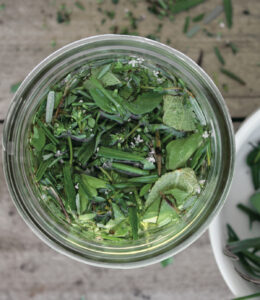Try this age-old four thieves vinegar solution for cleansing your home during flu season. You need only a few simple ingredients to make this four thieves recipe.
There is an old legend of four thieves who went around robbing the homes and graves of those who had been stricken by the plague during medieval times. The mystery of why they never got sick themselves was solved when they were finally captured and gave up their secret in exchange for pardons of their crimes. They claimed to have steeped a special blend of herbs in vinegar, then soaked rags in it to cover their faces and to wash with during and after their nefarious acts. Whether such a band of thieves actually existed or not may never be known, but scientific research today tells us that many aromatic herbs do indeed have strong disinfecting and antimicrobial properties. I like to make up a large batch of this vinegar each year to keep on hand for use during cold and flu season. It’s great for cleaning surfaces such as sinks, light switches, toilet seats, refrigerator handles, and other places germs might lurk. While there may have been only four thieves in the legend, you’re not limited to using just four herbs in this recipe. The original formulas that sprang up around that time were thought to contain many herbs, for the widest array of benefits possible.
Yield: 1-1 ⁄2 Cups (375ml)
Ingredients:
Instructions:
Place the herbs in a pint (500-ml) canning jar. Some variations of the recipe contain cloves, for their potent germ-fighting properties. If you like their scent, try adding a few to the jar. Pour the vinegar over the herbs. Add extra vinegar, if needed, to ensure that the herbs are fully covered.
Cover with a nonmetallic lid or place a few layers of wax paper or plastic wrap between the jar and metal lid, to prevent corrosion from the vinegar.
Set the vinegar in a dark place to infuse for 1 to 2 weeks. Strain and store in a glass jar. Shelf life is at least one year.
To use, dilute with equal parts of water, and spray on soiled or germy areas, then wipe off with old rags or paper towels. Vinegar can damage or cause etching on granite, stone or marble, so avoid using on those types of surfaces.
Tip: If you don’t have fresh herbs, try using half as much dried herb instead.
More from 101 Easy Homemade Products for Your skin, Health & Home:
Reprinted with permission from 101 Easy Homemade Products for Your Skin, Health & Home by Jan Berry, Page Street Publishing Co. 2016. Photo credit: Jan Berry.





